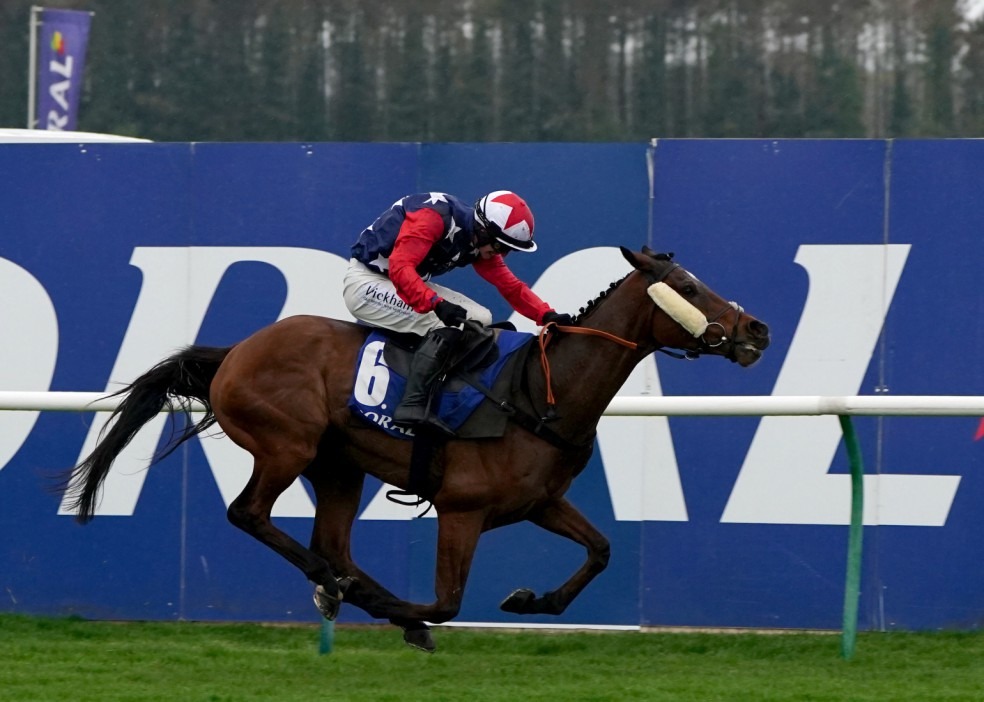Get ready for the big race!
The highly anticipated Scottish Grand National is set to take place at Ayr Racecourse today. As the excitement builds, here is the full list of runners and their numbers for the National:
1. Stay Away Fay – Jockey: Harry Cobden, Trainer: Paul Nicholls
2. Mr Incredible – Jockey: Patrick Mullins, Trainer: Willie Mullins
3. Elvis Mail – Jockey: Bruce Lynn, Trainer: Nick Alexander
4. Beauport – Jockey: Jordan Nailer, Trainer: Nigel Twiston-Davies
5. Ontheropes – Jockey: Brian Hayes, Trainer: Willie Mullins
6. Spanish Harlem – Jockey: Paul Townend, Trainer: Willie Mullins
7. Gold Cup Bailly – Jockey: JJ Slevin, Trainer: Simon Crawford
8. Iron Bridge – Jockey: Jonjo O’Neill Jr, Trainer: Jonjo O’Neill
9. Whistleinthedark – Jockey: Danny McMenamin, Trainer: Laura Morgan
10. Ballygrifincottage – Jockey: Harry Skelton, Trainer: Dan Skelton
11. Macdermott – Jockey: Danny Mullins, Trainer: Willie Mullins
12. Tommie Beau – Jockey: Micheal Nolan, Trainer: Seamus Mullins
13. Broken Halo – Jockey: Bryony Frost, Trainer: Paul Nicholls
14. Mr Vango – Jockey: Jack Tudor, Trainer: Sara Bradstock
15. Autonomous Cloud – Jockey: Jonathan Burke, Trainer: Fergal O’Brien
16. Anglers Crag – Jockey: Henry Brooke, Trainer: Brian Ellison
17. Inis Oirr – Jockey: Derek Fox, Trainer: Lucinda Russell
18. My Silver Lining – Jockey: James Best, Trainer: Emma Lavelle
19. Git Maker – Jockey: Gavin Sheehan, Trainer: Jamie Snowden
20. Surrey Quest – Jockey: Kevin Brogan, Trainer: Toby Lawes
21. Klarc Kent – Jockey: Sean O’Keeffe, Trainer: Willie Mullins
22. Whacker Clan – Jockey: Rachael Blackmore, Trainer: Henry de Bromhead
23. Egbert – Jockey: Brendan Powell, Trainer: Alan King
24. Punitive – Jockey: William Maggs (7), Trainer: Peter Bowen
25. Secret Reprieve – Jockey: James Turner (7), Trainer: Evan Williams
26. We’llhavewan – Jockey: Kieran Callaghan (5), Trainer: Willie Mullins
Frequently Asked Questions
At what age should a horse start race training?
While horses can begin basic race training as young yearlings (or even younger), most start their more intensive training when they reach two years of age. When their bodies are mature and able to handle the stress of the track, but still young enough to learn. The exact timing depends on the horse’s maturity and temperament.
Different horse breeds require different race training techniques
It is true that race training can differ for different horse races, due to the differences in breed characteristics and distances. For instance, Thoroughbreds, which are commonly associated with long-distance flat racing, undergo different training compared to Quarter Horses, which specialize in sprinting short distances. Each breed is unique and requires a different approach to match their physical characteristics and behaviors.
What kind of diet is best for a racing horse?
Racehorses need a diet that is high quality and perfectly balanced to support their training and racing. It is a combination of hay of the highest quality, grains, such as barley or oats, and commercially-prepared feed for racehorses. The diet should also be supplemented by essential vitamins and mineral to promote overall health and performance.
How can I prepare my horse for racing?
Racehorse conditioning is a gradual, multi-faceted process. It involves both longer, slower distance work, which builds stamina, as well shorter, quicker workouts, which develop speed. It is important to strengthen the horse’s cardiovascular system, muscles, and skeletal structures over time by following a regiment that mimics racing conditions without causing injury.
How critical is the horse’s pedigree in racing success?
While pedigrees can be used as a predictor of potential in a racehorse, they are not the only factors that influence their performance. A horse’s lineage may suggest an inherited aptitude for speed or endurance, but training, health, and temperament are also influential factors. Good training will maximize a horses natural abilities and may even enable it to outperform those with more impressive bloodlines.
How do you maintain your racehorse’s mental health?
Maintaining a racehorse’s mental health as well as their physical condition is crucial. Mental stimulation, gentle handling, and regular pasture turnout all contribute to the psychological well-being of a racehorse. It is important to ensure that the horse interacts with other horses, and maintain a calm and stable environment. This will help prevent behavioral problems and stress.
Statistics
- An extensive survey indicated that over 90% of racehorse trainers utilize swimming as a low-impact exercise in their conditioning routines.
- The majority of racehorses in training are subject to an exercise regimen that includes being ridden six days a week.
- Approximately 70% of a racehorse’s diet consists of forage, with the remainder made up of grains and supplements to meet their high-calorie needs.
- The average cost to train a thoroughbred racehorse for one year can exceed $50,000, accounting for expenses related to training, boarding, and veterinary care.
- Studies suggest that proper early training can reduce the risk of musculoskeletal injuries in racehorses by up to 50%.
- Around 80% of thoroughbred racehorses begin their racing careers by the age of two, according to industry estimates.
External Links
equibase.com
paulickreport.com
keeneland.com
thoroughbredracing.com
horseracing.com
thoroughbred-racing.net
How To
How to monitor racehorse’s health during training
In order to maintain a racehorse’s health, regular health checks are essential. Daily visual inspections are essential. Pay attention to the horse’s behavior, gait and appetite. Schedule regular veterinary examinations, including dental and hoof care. Track workout data and heart rate post-exercise to detect any deviations that may indicate health issues. Address minor health concerns immediately to avoid them escalating and becoming more serious.

